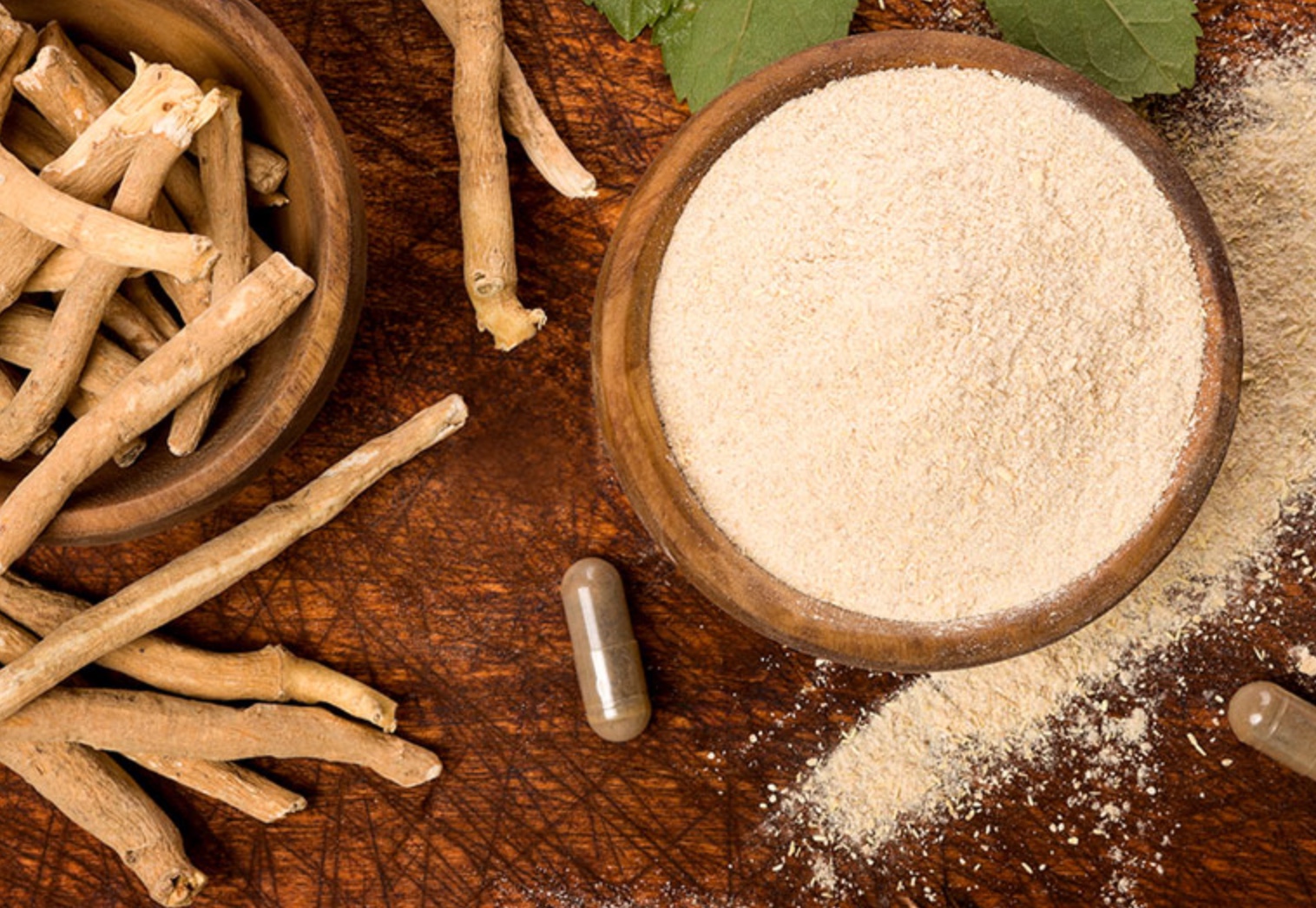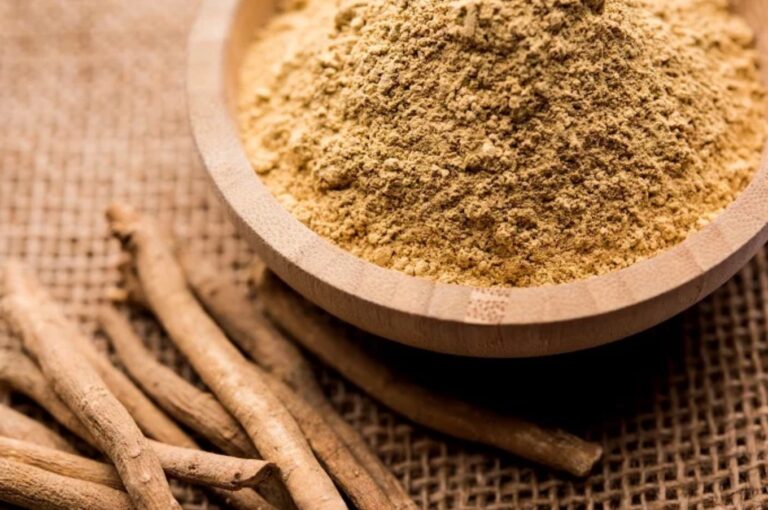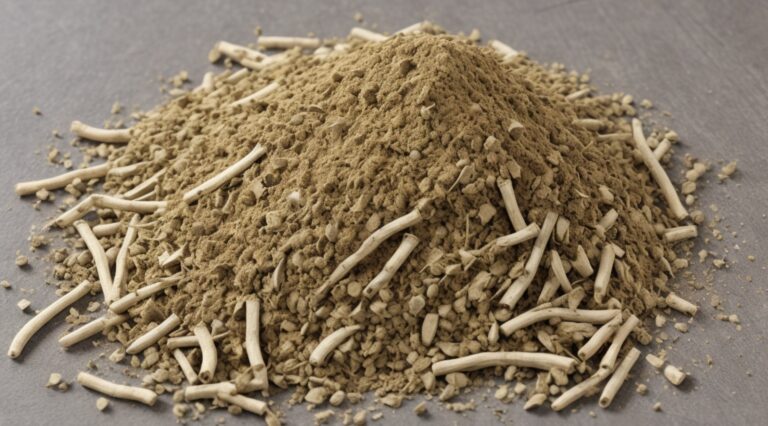Nutritional Composition of Ashwagandha

Ashwagandha Expert is a project that offers the most accurate information in an accessible, understandable and applicable way so that readers can make the best...Read more
✅ Evidence-Based
⚙️ Methodology
From the author:
Ashwagandha, an ancient Ayurvedic remedy, stands as a trusted solution. Also named Withania somnifera, this shrub from India, the Middle East, and parts of Africa has gained recent attention for stress reduction and anxiety relief.
[Read: What is Ayurveda? Principles, Practices Benefits and Risks]
Its potency lies in a rich nutritional profile, featuring bioactive compounds like alkaloids and steroidal lactones. These elements contribute to therapeutic effects, making ashwagandha a nutritional powerhouse with carbs, protein, fiber, and essential vitamins.
Furthermore, ashwagandha boasts impressive amino acid content, covering all our body’s essential needs. To truly understand its health potential, exploring its bioactive compounds, macronutrient profile, and vitamins allows us to appreciate its positive impact on well-being. In a world seeking natural remedies, ashwagandha emerges as a time-tested ally for a balanced life.
Let’s take a look at the ingredients of this plant.
My Pick

Double Wood Supplements Ashwagandha 500mg
I picked Double Woods Supplements for my Ashwagandha, and it turned out good. The product doesn’t have a bad smell. It worked well for me. If you’re new to Ashwagandha, go for the 500 mg one from Double Products Supplements. It’s a good choice.
Small note: If you purchase the product through the button below, I may earn a small commission and continue this project.
Ashwagandha at a glance
Ashwagandha is a powerful herb in Indian Ayurvedic medicine, celebrated for its tonic properties. Scientific studies attest to Ashwagandha’s prowess in boosting endurance, alleviating stress, and providing protection against stress-induced stomach ulcers. Its anxiolytic effects, coupled with improvements in energy levels and mitochondrial health, make it a valuable addition.
Ashwagandha exhibits anti-inflammatory and anti-arthritic properties, demonstrating efficacy in clinical cases of both Rheumatoid and Osteoarthritis.
Nutritional Value of Ashwagandha

| Nutritional Value of Ashwagandha | ||||
|---|---|---|---|---|
| Nutrients (in 100 grams of Ashwagandha) | Its amount | |||
| Energy | 245 kcal | |||
| Fat | 0 | |||
| Protein | 0.3 grams | |||
| Iron | 3.3 mg | |||
| Sugars | 0 gram | |||
| Carbohydrate | 49.9 gram | |||
| Calcium | 23 mg | |||
| Dietary Fibre | 32.3 g | |||
| Vitamin C | 3.7 mg | |||
Micronutrients Per 100 g of Ashwagandha:
| Micronutrient | Value |
|---|---|
| Vitamin A | 75.7 µg |
| Vitamin B6 | 0.8 mg |
| Vitamin B12 | 1.3 µg |
| Pantothenic acid | 3 mg |
| Riboflavin | 1.4 mg |
| Thiamine | 1.1 mg |
| Vitamin C | 9.5 mg |
| Fiber | 32.2 mg |
| Calcium | 23 mg |
| Iron | 3.3 mg |
| Copper | Moderate amount |
| Zinc | 5 mg |
Glycemic Index of Ashwagandha
The Glycemic index of Ashwagandha is 37.27
Ashwagandha comes as a powder. It’s made from the Ashwagandha plant’s root and gets mixed into different foods. The powder has a low glycemic index and a moderate glycemic load, making it good for managing diabetes. Using Ashwagandha powder can help control blood sugar levels positively.
Primary Bioactive Compounds
As an adaptogenic herb, ashwagandha contains a variety of bioactive compounds that are responsible for its health benefits. The primary bioactive compounds found in ashwagandha are withanolides, alkaloids, and saponins.
[READ: What Are Adaptogens? Popular Herbs, Types, Benefits & Risks]
Withanolides
Withanolides are a group of naturally occurring steroids that are unique to the nightshade family of plants. Ashwagandha is particularly rich in withanolides, with over 40 different withanolides identified in the plant. These compounds are responsible for many of the herb’s health benefits, including its anti-inflammatory, anti-tumor, and anti-stress properties. Withanolides are also believed to play a role in improving cognitive function and memory.
Alkaloids
Alkaloids are a class of nitrogen-containing compounds that are found in many plants, including ashwagandha. The most well-known alkaloid in ashwagandha is somniferine, which has been shown to have sedative properties. Other alkaloids found in ashwagandha include anaferine, isopelletierine, and anahygrine. These compounds are believed to have a variety of health benefits, including anti-inflammatory and anti-tumor properties.
Saponins
Saponins are a group of glycosides that are found in many plants, including ashwagandha. These compounds are known for their ability to lower cholesterol levels and improve immune function. In ashwagandha, the most abundant saponin is called withanoside IV. This compound has been shown to have anti-inflammatory and anti-tumor properties, as well as the ability to improve cognitive function.
The presence of these bioactive compounds in ashwagandha makes it a valuable addition to any diet. While more research is needed to fully understand the mechanisms behind the herb’s health benefits, the evidence so far suggests that ashwagandha is a powerful tool for promoting overall health and well-being.
Macronutrient Profile
Ashwagandha is a nutrient-dense herb that contains several macronutrients, including proteins, carbohydrates, fibers, and fats. These macronutrients are essential for the proper functioning of the body and provide energy for various bodily activities.
Proteins
Ashwagandha contains a significant amount of proteins, which are essential for muscle growth and repair. According to a study published in the Journal of Ethnopharmacology, ashwagandha contains approximately 3.9% proteins . Proteins are made up of amino acids, which are the building blocks of the body. Ashwagandha contains all the essential amino acids required by the body, making it a complete protein source.
Carbohydrates
Carbohydrates are the primary source of energy for the body. Ashwagandha contains approximately 46.9% carbohydrates, which are mainly in the form of glucose and fructose. These carbohydrates are easily absorbed by the body and provide quick energy.
Fibers
Ashwagandha contains a significant amount of dietary fibers, which are essential for maintaining digestive health. According to a study published in the Journal of Agricultural and Food Chemistry, ashwagandha contains approximately 36.6% fibers. These fibers help in regulating bowel movements and prevent constipation.
Fats
Ashwagandha contains a small amount of fats, which are essential for the proper functioning of the body. According to a study published in the Journal of Ethnopharmacology, ashwagandha contains approximately 0.6% fats. These fats are mainly in the form of unsaturated fatty acids, which are beneficial for heart health.
Ashwagandha is a nutrient-dense herb that contains several macronutrients, including proteins, carbohydrates, fibers, and fats. These macronutrients are essential for the proper functioning of the body and provide energy for various bodily activities.
Vitamins and Minerals
Ashwagandha root powder is a rich source of various vitamins and minerals that are essential for maintaining good health. In this section, I will discuss the most significant vitamins and minerals found in ashwagandha.
Vitamin C
Ashwagandha root powder is a good source of vitamin C, which is a potent antioxidant that helps to fight against free radicals in the body. According to a study published in the Journal of Food Science and Technology, ashwagandha root powder contains 17.5 mg of vitamin C per 100g. Vitamin C is essential for collagen synthesis, wound healing, and boosting the immune system.
Calcium
Calcium is an essential mineral that is required for strong bones and teeth. Ashwagandha root powder is a good source of calcium, with 100g of ashwagandha root powder containing 670 mg of calcium. Calcium is also essential for muscle function, nerve transmission, and blood clotting.
Iron
Iron is an essential mineral that is required for the formation of red blood cells. Ashwagandha root powder is a good source of iron, with 100g of ashwagandha root powder containing 7.7 mg of iron. Iron is essential for oxygen transport, energy metabolism, and immune function.
In conclusion, ashwagandha root powder is a rich source of various vitamins and minerals that are essential for maintaining good health. Vitamin C, calcium, and iron are the most significant vitamins and minerals found in ashwagandha.
Amino Acid Content
Ashwagandha is a rich source of amino acids, which are the building blocks of proteins. It contains all the essential amino acids, which are not produced by the body and must be obtained from the diet. The amino acid content of ashwagandha varies depending on the part of the plant used, the method of extraction, and the geographical location where it is grown.
Some of the major amino acids found in ashwagandha include:
- Aspartic acid: This amino acid plays a crucial role in the synthesis of other amino acids and is involved in the production of cellular energy. It is also important for the proper functioning of the nervous system.
- Glutamic acid: This amino acid is involved in the synthesis of proteins and is important for the proper functioning of the brain and nervous system. It is also a precursor to the neurotransmitter GABA, which helps to regulate mood and anxiety.
- Arginine: This amino acid is involved in the synthesis of nitric oxide, which helps to dilate blood vessels and improve blood flow. It is also important for the proper functioning of the immune system and the production of growth hormone.
- Leucine: This amino acid is involved in the synthesis of proteins and is important for muscle growth and repair. It is also involved in the regulation of blood sugar levels and the production of growth hormone.
- Tyrosine: This amino acid is a precursor to the neurotransmitters dopamine, norepinephrine, and epinephrine, which are involved in the regulation of mood, stress, and energy levels. It is also important for the proper functioning of the thyroid gland.
Ashwagandha Expert is a project that offers the most accurate information in an accessible, understandable and applicable way so that readers can make the best possible decisions about the Ashwagandha plant and its use.
More Posts





